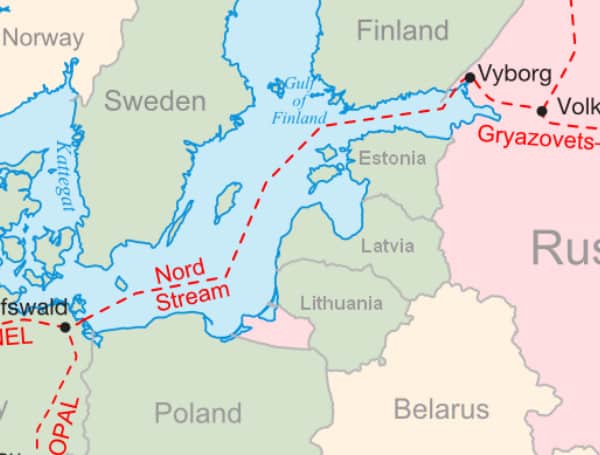In a move to bolster Europe’s energy independence and counter Russia’s geopolitical ambitions, U.S. Senator Ted Cruz (R-Texas) and Congressman Andy Barr (R-Ky.) have introduced the Securing Europe’s Energy Security Act of 2024 (SEESA).
This legislation aims to preserve the sanctions mandated under the Protecting Europe’s Energy Security Act (PEESA), which were instrumental in halting the construction of the Nord Stream 2 pipeline in 2019.
The Nord Stream 2 pipeline, a project spearheaded by Russian President Vladimir Putin, has long been viewed as a strategic tool to exert influence over Europe’s energy supply and undermine American national security interests.
Read: Texas Power Grid Could Be Pushed To The Brink Again This Summer, Utility Exec Says
By introducing SEESA, Cruz and Barr seek to prevent the pipeline from ever becoming operational, ensuring that Russia’s ability to wield energy as a weapon against U.S. allies remains curtailed.
The Nord Stream 2 pipeline, a $10 billion natural gas pipeline project, has been a source of contention between the United States and its European allies. Proposed to run from Russia to Germany, bypassing traditional transit countries like Ukraine, the pipeline was seen as a means for Putin to tighten his grip on Europe’s energy supply and leverage it for political gain.
The pipeline’s potential to increase Europe’s reliance on Russian gas and diminish the continent’s energy diversification has been a major concern for U.S. policymakers. By circumventing Ukraine, Nord Stream 2 would also deprive the country of crucial transit fees, potentially weakening its economy and geopolitical standing.
Beyond the energy security implications, the Nord Stream 2 pipeline was viewed as a direct threat to American national security. The pipeline’s completion would have empowered Russia to exert greater influence over Europe, undermining the United States’ ability to ensure the safety and security of its allies.
In response to these concerns, the U.S. Congress took decisive action in 2019 by enacting the Protecting Europe’s Energy Security Act (PEESA). This legislation, co-authored by Senators Cruz and Jeanne Shaheen (D-N.H.), imposed sanctions on entities involved in the construction of the Nord Stream 2 pipeline, effectively halting its progress.
Read: Outrage Over Biden’s Border Order: Texas Sen. Ted Cruz Calls It ‘Too Little, Too Late’
The sanctions mandated by PEESA were immediately effective, leading to the suspension of construction activities on the pipeline. This victory for American and European interests was celebrated as a significant setback for Putin’s geopolitical ambitions.
However, the success of PEESA was not without a looming challenge. The sanctions are set to expire at the end of December 2024, raising the specter of the pipeline’s potential reactivation and the resurgence of Russia’s influence in the region.
Recognizing the urgency of the situation, Senators Cruz and Barr have introduced the Securing Europe’s Energy Security Act of 2024 (SEESA). This new legislation aims to extend the sanctions mandated by PEESA, ensuring that the Nord Stream 2 pipeline remains offline and that Russia’s ability to use energy as a geopolitical weapon is permanently curtailed.
Read: Alabama Sen. Britt, Texas Sen. Cruz Leads Charge To Repeal Biden’s Controversial Natural Gas Tax
Key Provisions of SEESA
The SEESA bill includes several critical provisions:
- Extending PEESA Sanctions: The legislation would preserve the sanctions imposed under PEESA, preventing the pipeline’s construction from resuming.
- Barring Presidential Waivers: SEESA would prohibit the President from waiving these sanctions through national security findings, further solidifying the sanctions’ effectiveness.
- Bipartisan Support: The bill has garnered the support of several Republican senators, including John Barrasso (R-Wyo.), Tom Cotton (R-Ark.), and James Risch (R-Idaho), underscoring its bipartisan nature.
In a joint statement, Senators Cruz and Barr emphasized the importance of SEESA in safeguarding Europe’s energy security and American national security interests.
Senator Cruz stated, “The Nord Stream 2 pipeline has always been a geopolitical tool that Vladimir Putin intended to use, and eventually did use, to blackmail America’s European allies and to undermine American national security.”
Congressman Barr echoed these sentiments, declaring, “Allowing the Nord Stream 2 pipeline to ever become operational would not only jeopardize Europe’s energy independence but also empower Russia’s adversarial influence in the region.”
The introduction of SEESA comes at a critical juncture, as the world continues to grapple with the consequences of Russia’s unprovoked invasion of Ukraine. The preservation of the PEESA sanctions is seen as a crucial step in maintaining pressure on the Kremlin and safeguarding the energy security of America’s European allies.
Strengthening Transatlantic Cooperation
The passage of SEESA would reinforce the strong transatlantic partnership between the United States and its European allies, demonstrating a unified front against Russian aggression and energy-based coercion.
Ensuring Europe’s Energy Independence
By preventing the reactivation of the Nord Stream 2 pipeline, SEESA would bolster Europe’s energy diversification efforts, reducing its reliance on Russian gas and strengthening its overall energy security.
Countering Russian Influence
The continued enforcement of sanctions on the Nord Stream 2 project would deny Russia a valuable geopolitical tool, limiting its ability to exert influence over European affairs and undermining its broader strategic objectives.
Help support the Tampa Free Press by making any small donation by clicking here.
Android Users, Click To Download The Tampa Free Press App And Never Miss A Story. Follow Us On Facebook and Twitter. Sign up for our free newsletter.

